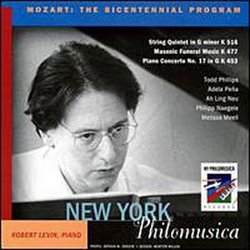An affecting tombeau
Frank W. Barham | Greenbank, WA USA | 08/27/2005
(5 out of 5 stars)
"Though Robert Levin is best known for his period instrument performances, I actually prefer to hear him playing a modern grand piano, judging from this disc and his Brahms Piano Quartet and Trio, also on Philomusica. These live performances commemorated the 200th anniversary of Mozart's death. If you are worried that the sound may be less than ideal or that the playing may be slightly shaggy, don't be. Everything here is top-drawer. Levin recorded this same concerto (No. 17 in G Major, K453) for Decca on a fortepiano. That's fine, but I prefer this. There's more life. Hogwood's orchestral contribution to the Decca disc is a little stolid. Here it all bursts into life. The result is my favorite version of this elusive concerto. Equally compelling is the G Minor String Quintet, K516. In my view it was a great day for chamber music when Todd Phillips decided to bypass most of the violin concerto repertoire in deference to music for smaller ensembles. He and his colleagues fully rise to the challenge of this most demanding and rewarding piece. Lastly, a neglected masterpiece, the Adagio and Fugue in C Minor, K546, makes an appropriately sombre contribution to this affecting tombeau.
-Frank W. Barham"
The Finest Recording of Them All
Peter Smith | Buffalo NY USA | 10/09/2009
(5 out of 5 stars)
"Just a little while ago, I listened to this disc for the umpteenth time, prompted by my having read a review article in "Collector's Guide" in which Nigel Simeone gives a critique of all the recordings of K453 he could find; it's a superb essay, and well worth offering the injunction I used to receive from my English teacher in grammar school - Read, mark, learn and inwardly digest.
Taking in that exhaustive study, though, and now listening again to this NY Philomusica recording, have served to get me off the dime at long last and to write this piece. The fact is that I have been listening to this extraordinary ensemble since 1972, both live and through its recordings. The ONLY thing that prevents my being on Cloud Nine or in Seventh Heaven when I listen to NYPm is that their recordings are not more widely known and more frequently reviewed; and I cannot but regret that because the FACT is that these players have always been men and women who play as though their lives depended on it - whereas, in fact, finally, "all" that actually "depends on it" is that the playing is done to their own satisfaction. Which, among musicians at the top of the heap, is more or less saying the same thing twice. Or - to say it a third time - they play as though the music may never be heard again, which means that they must play it as close to perfectly as they can - and, of course, from the heart.
So I hope, dear reader, that you will buy this disc and that you will come to treasure it as I do. And it is then very likely that you will find the NYPm recordings of the serenades and divertimenti of Mozart irresistible. The "bite" that those genius-violinists, Felix Galimir and Isidore Cohen, bring to their playing is such that every time one of these masterpieces begins one is made to think that one is hearing it for the very first time. Chamber music performance simply does not come any better than this.
Here are some excerpts from Mr Simeone's article about this most delightful of the Mozart piano concerti:
"Robert Levin with the Academy of Ancient Music conducted by Christopher Hogwood are in a class apart. Though deleted, this disc is still available as an authorised reissue from [...], and nobody interested in historically informed playing should be without it. Levin's Mozart is extremely individual: like Staier (only more so) he improvises along with the orchestra in tuttis, decorates solo lines liberally and plays extemporised cadenzas. The results are utterly compelling - there's such spirit and natural phrasing here....
"Levin made another performance of K453 on a modern piano in 1991, at a concert with the New York Philomusica. The familiar Levin traits are here: filling out the tuttis with inventive continuo playing, and playing extemporised cadenzas, accompanied by a small and ideally proportioned orchestra. The results are simply joyous: an inspired combination of musicianship and scholarship. ...
"A few discs stand out. Edwin Fischer is stylish, brisk and ideally scaled, while Serkin and Szell generate thrilling levels of rhythmic energy. So does Brendel with Mackerras and the Scottish Chamber Orchestra: they find all the harmonic boldness and poetry in this music without ever fussing over it. For a more traditional approach, it's hard to imagine more attractive and insightful playing than Perahia or Zacharias (MDG). Badura-Skoda is a little more gritty, but no less inspiring, while Pollini is supremely poised but still catches all the music's wit. On period instruments Levin and Hogwood are outstanding, while on DVD Leonard Bernstein's life-enhancing Vienna Philharmonic concert preserves one of his finest performances as a pianist. But if I had to choose just one version, it would be Robert Levin's with the New York Philomusica - Mozart playing at its most spontaneous and uplifting."
I couldn't have said it better myself. And I doubt that Mozart could have either!"


 Track Listings (8) - Disc #1
Track Listings (8) - Disc #1